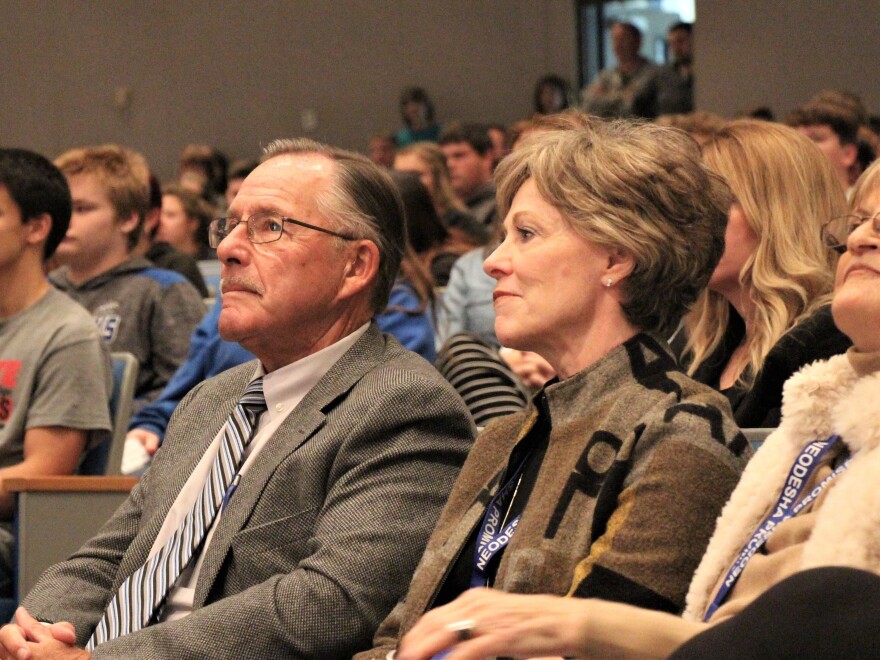Three hundred middle and high schoolers filed into their school auditorium recently in the small, southeast Kansas town of Neodesha, uncertain why they'd been called there.
They left cheering and hugging. Some of the older students were teary-eyed.
College tuition and fees need no longer hold back graduates of this manufacturing community, about halfway between Wichita, Kan., and Joplin, Mo. Wealthy retired businessman Ben Cutler hopes to turn around the fortunes of his dwindling hometown — population 2,300 — and will foot those costs for the next 25 years, and possibly decades beyond that.
"I'm still in shock right now," De'Jua Pouncil, a senior aiming to study dental hygiene at Wichita State University, said after the announcement. "I've been really saving up for college. I know most of my classmates have been also saving up — working real hard. And this is just a real relief off of our shoulders."
Translating this gift into economic growth for Neodesha won't be easy. The donor and community leaders are banking on families moving here to qualify their kids for free tuition. The influx they envision would boost the local tax base, shore up the shrinking school district and bring more customers for everything from utilities to groceries.
But the town faces strong headwinds, experts say, including an affordable housing shortage. And even if Neodesha benefits, it may pull people away from other shrinking towns nearby.
"If you're thinking about regional economic development," said Matthew Sanderson, a Kansas State University sociologist who studies rural issues, "at least at this stage, it looks more like a zero-sum game."
The Neodesha promise
Cutler left Neodesha in the 1960s for degrees at the University of Kansas and the University of Pennsylvania's Wharton Business School, and went on to a lucrative career in finance and insurance.
He recalls what the town of his youth — population 3,600 in 1960 — was like before Standard Oil and a few other important employers left.
"I'm fully aware of the extent of the challenges we're going to face," Cutler said. That includes a kind of collective town psychology depressed from so many years of watching neighbors move away.
"But if we can make some progress, I think it can have a profound impact on the trajectory of this little community."

The Neodesha of today has several manufacturing plants. Hundreds of people drive in daily from other towns to work at places such as Cobalt Boats, a maker of luxury motorboats with dealerships across the globe. Workers here produce the company's entire stock.
Cutler's idea aims, in part, to tempt some of those commuters to move to Neodesha with their children.
But there are stipulations: Graduates must earn a 2.5 GPA in high school and check a few other boxes. After that, they can use the money for the two- or four-year studies of their choice, at any college anywhere.
Those angling for a bachelor's degree can count on annual funding up to the cost of tuition and fees at the priciest state school — this year that's KU at just above $11,000.
Though the scholarship won't cover room and board, it could make a difference in how many teens head to college, and how many years they spend saddled with student debt. Though more than nine in 10 Neodesha students finish high school, only four in 10 are at college two years later or have finished a post-secondary credential. Neighboring school districts have similar statistics.
Housing and other hurdles
Neodesha appears to be the first "Promise" program in Kansas, but takes its cue from initiatives across the country. Program leaders in El Dorado, Arkansas, for example, say the concept brought academic and economic benefits.
El Dorado, though similarly rural, is eight times the size of Neodesha. It's a regional economic hub, with tourism attractions and the global headquarters of Murphy Oil.
Kimberly Zarecor, a professor of architecture at Iowa State University, cautions against comparisons with other Promise programs.
"El Dorado is totally different," said Zarecor, who studies the viability of rural communities. "Making any kind of claim between the two makes no sense."
Neodesha's program will have to attract more employers and jobs if the city hopes for economic growth, Sanderson said. He added that while he's never seen a town take Neodesha's approach, he's "cautiously optimistic."
"I hope it works," he said. "Maybe it'll become a model."
City leaders have begun working on the town's most immediate hurdle, housing, by striking a deal with a rural housing company in Iowa.
Wedged between two rivers, flooding destroyed dozens of Neodesha homes a decade ago, so there are limits to where the town can rebuild.
Plus, like much of rural America, Neodesha lacks affordable yet quality housing. Old houses in bad shape cost more to renovate in remote areas, and building new homes can be equally tricky.
Other hurdles that Sanderson and other academics said Neodesha will face:
Jeremy Hill, director of the Center for Economic Development and Business Research at Wichita State, thinks Neodesha may gain residents, but warned people are more "place-based" than might be obvious.
"Particularly in that region," he said, where commuting for manufacturing jobs is the norm. "They have their families, they have their church structures, they have their social groups."
Copyright 2020 KCUR 89.3. To see more, visit KCUR 89.3. 9(MDAwMTM1NDgzMDEyMzg2MDcwMzJjODJiYQ004))


